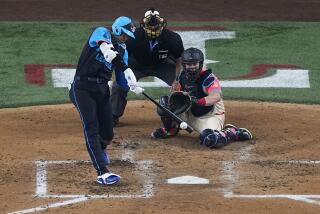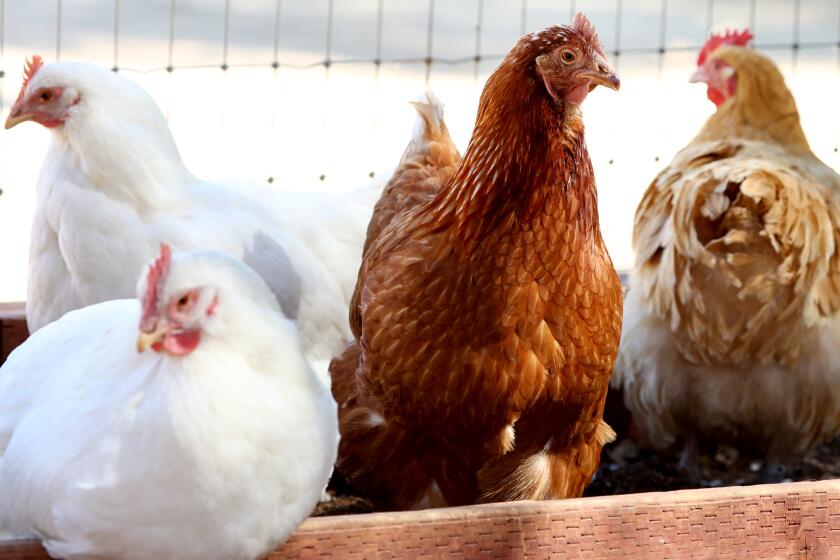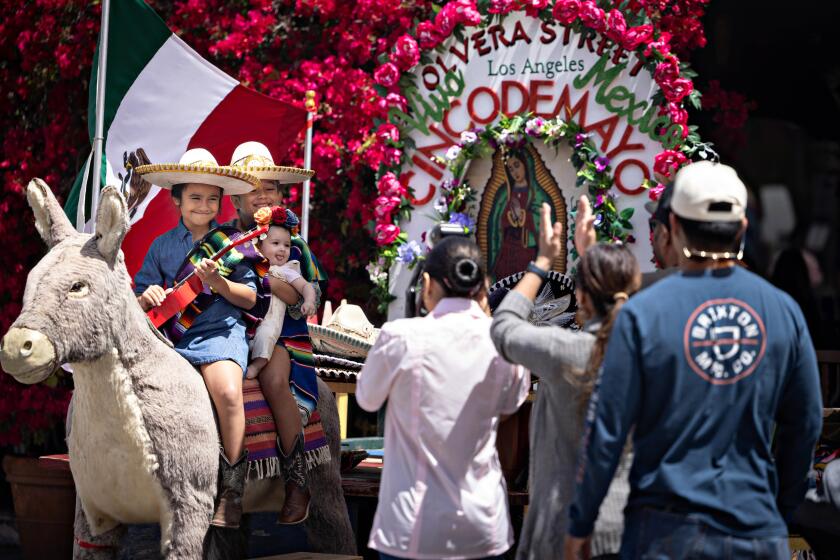Race Official Expects to Find More Cocaine
Len Foote, the secretary of the California Horse Racing Board, said Wednesday that he expects the state’s testing laboratory to find more cocaine in horses’ urine samples that have been frozen and stored since last July.
“In the first batch, we found four positives for cocaine,” Foote said. “In all probability, there will be additional positives. At least that’s my informed guess.”
The horses of six trainers, including nationally known Wayne Lukas and Laz Barrera, have tested positive for cocaine in California--one last October and five that were announced last week. Four of the six positives were from frozen samples, including a horse that ran in late August at Del Mar.
Foote said the state laboratory has retested about 4,000 samples. The laboratory started using screening equipment more sensitive to cocaine after the rarely detected drug turned up in a horse run by trainer Roger Stein at Santa Anita last October.
The state’s inventory still consists of about 8,000 samples.
“Our improvements in testing have increased 10-fold,” Foote said. “I expect the percentage of positives to hold up in the samples that remain to be tested. If that’s so, then there could be 12 more positives.”
Cocaine is not considered to be commonly used in horses, but there have been at least three instances in which the drug has been detected in horses in California in the last 14 years--in a case Foote recalled five or six years ago, in an incident that led to the suspension of a trainer at the San Joaquin County Fair at Stockton in 1975, and in an investigation centering on a quarter horse trainer at Los Alamitos last fall.
“In 23 years with the board, I’ve never seen a sequence of events like we’ve had lately,” Foote said.
Although he said he believed that Truesdail Laboratories, which is contracted to test for the board, had done accurate work, Foote added that it was possible that the cocaine could have accidentally wound up in the horses’ systems.
“We would not have announced the names of people like Laz Barrera and Wayne Lukas unless we were very, very sure, and we are (sure),” Foote said. “I was as shocked as anyone to see these names surface. But if there was deliberate administration of cocaine, we would be seeing much higher levels in the tests.”
None of the six trainers--Lukas, Laz Barrera and his son Albert, Stein, Bryan Webb and Anthony Hemmerick--has accepted the test results. All of the trainers except Stein and Albert Barrera, in a decision that Foote defended Wednesday, are being allowed to conduct business as usual until hearings with stewards are held, complaints are filed and rulings--possible suspensions and fines--are made.
Stein, who was quickly suspended for six months and fined $2,000 when his horse tested positive last year, is appealing the ruling and takes exception to what he says is a double standard. Albert Barrera has been told that his five horses at Santa Anita will not be allowed to run in his name.
“I predict that there will be nothing happening to Mr. Lukas and Mr. Barrera,” Stein said. “They are trainers with names that would slow down racing if they couldn’t run their horses. But does this mean that if you committed a crime five months ago, you don’t have to go to jail?”
In explaining why four of the trainers can still race and two others cannot, Foote said: “There is no similarity. The four still training didn’t have a positive that happened yesterday, and we view their operations as having no clear and present danger to the sport.”
The positives for the horses run by Stein and Albert Barrera were discovered a few days after races. The Barrera positive was from a race two weeks ago.
Even if the trainers under investigation were the victims of contaminated urine samples, they would still be subject to suspensions because of racing’s trainer-responsibility rule.
“It’s a form of being considered guilty until you can establish your innocence,” Foote said. “In racing, no viable alternative has ever been found. In Illinois, the racing board once was mandated by a court not to enforce the rule, and that lasted only one day.
“If there are those who are responsible for these positives other than the trainers involved, then we need the cooperation of every horseman. There are many eyes and ears on the backstretch.”
Foote said that employees who handle horses’ postrace samples at the detention barn are being checked, but he did not seem optimistic about finding anything.
“In case after case, the trainer has born the brunt of the positive test,” Foote said. “Seldom do we find a phantom.”
More to Read
Go beyond the scoreboard
Get the latest on L.A.'s teams in the daily Sports Report newsletter.
You may occasionally receive promotional content from the Los Angeles Times.






